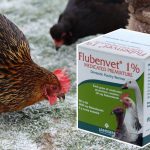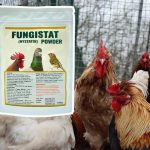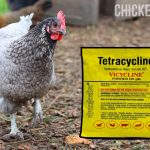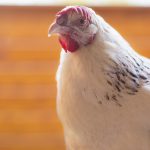5 Reasons your Chicken is making Gurgling Sounds
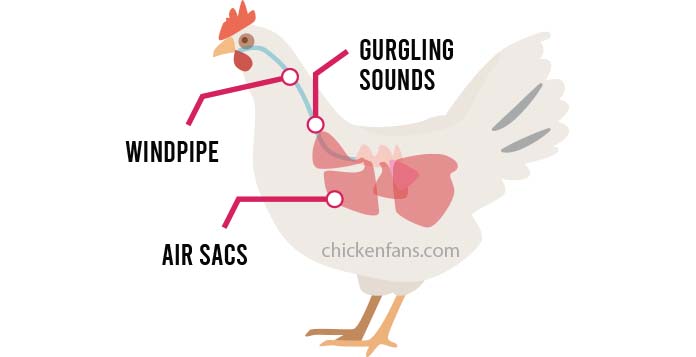

Hearing gurgling sounds and rattling in a chicken’s lungs can be scary. Chickens can have difficulty breathing while gasping for air. Should you be worried?
Let’s see.
Why is my chicken making gurgling sounds?
When a chicken makes gurgling sounds, it’s a sign of a respiratory tract infection. The windpipe and lungs fight against viral or bacterial infections. Gurgling sounds are usually caused by one of four widespread infections: Infectious Bronchitis, Chronic Respiratory Disease, Infectious Coryza, or Infectious Laryngotracheitis.
These are all common respiratory infections with similar symptoms.
Treatment and first aid
You can provide supportive care for respiratory infections to give your gurgling birds instant relief and aid recovery. There are several over-the-counter products available that can help alleviate the symptoms.

MicrocynAH Pink Eye Spray
For pink eye, eye discharge, infections of the eye
Manna Pro
BUY ON AMAZON

AMAZON
- Heat the VETRx in a small pan of water at medium temperature. Rub some warm VETRx from the bottle over the head of birds and under wings. Place a few drops of warm VETRx, straight from the bottle, down the throat of the infected bird at night.
- Add one teaspoon of warm VETRx to one cup of very warm water and drip the solution in the bird’s nostrils. If a cold develops into more severe roup, use one teaspoon of VETRx in half a cup of hot water. Also, swab the throat and wash the head and eyes with the stronger solution 4-5 times a day. Keep the nostrils, eyes, and throat as clean as possible.
- In case of eye infections, rinse the eye with MicrocynAH Pink Eye spray to clean the eye. Irrigation of the eye will prevent further infections and helps your chickens see clearly.
- In case of diarrhea due to a bacterial infection (e.g. coryza), add probiotic supplements to the diet. For adult birds, add 1 scoop per gallon of drinking water daily. Refresh the water every day.
These products will support healing but are not medicines that cure the disease. You can think of it as chicken Vap-o-Rub that you apply for sniffles.
For severe infections, further treatment depends on the type of infection. Antibiotics are only effective for bacterial infections like coryza. Probiotics, on the other hand, always boost a chicken’s immune system and are effective against infection-associated diseases.
Let’s have a look at each disease and see what other symptoms you might notice.
1. Infectious Bronchitis
Infectious Bronchitis in chickens is a global viral disease caused by coronavirus variants. It targets the respiratory system of chickens.
It’s contagious, but only to chickens. Typically, all of the chickens in a flock get infected.
The virus wreaks havoc on the windpipe, making it prone to secondary infections like Chronic Respiratory Disease, the next disease on our list.
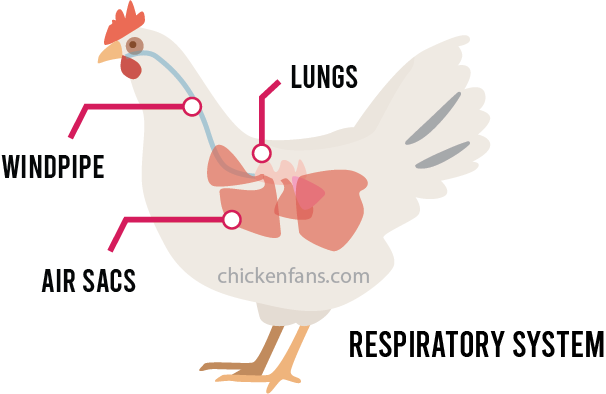
Infected chickens cough, sneeze, and will make gurgling sounds when breathing. The tracheal rales will stay for about two weeks until the bird starts to recover.
Apart from gurgling sounds, coughing, and shortness of breathing, the following symptoms may appear:
- facial swelling
- infection of sinuses with nasal discharge
- eye inflammation, watery, bubbly eyes
- reduced food intake and weight
- reduced egg-laying and deformed eggs
- ruffled feathers
- wet droppings
There can be other symptoms, like kidney inflammation, depending on the virus strain causing the infection.
As it’s a viral disease, antibiotics won’t cure it but are nevertheless regularly applied to prevent secondary infections. Several vaccines are available, but vaccination is not always successful since many strains exist.
2. Chronic Respiratory Disease
Chronic respiratory disease is a widespread bacterial disease. It’s one of the most common diseases affecting backyard chickens worldwide.
The infection is caused by the Mycoplasma Gallisepticum bacteria and can spread quickly through a flock. It tends to infect younger birds and birds in stressful situations.
A typical symptom is the gurgling sounds when the chicken is breathing. When the chicken inhales, you can hear a small clicking, bubbling, or rattling sound in the lungs and windpipe.
Apart from gurgling sounds, other symptoms include:
- coughing and gaping
- nasal discharge and sneezing
- eye inflammation, weepy, foamy eyes
- facial swelling
- head shaking
The disease can be treated with antibiotics. Sometimes the sinuses need to be flushed to remove nasal discharge buildup.
3. Infectious Coryza
Infectious Coryza is a very common disease that many poultry keepers will face once in their life. It’s a highly contagious bacterial disease, usually non-fatal, but it’s still prevalent since few chickens are vaccinated.
The bacteria are transmitted via contaminated food and water, direct contact, and aerosols in the air. It targets the respiratory system and will show up one to three days after infection.
The bacterial infection causes gurgling and rattling sounds in the windpipe and lungs. Chickens have difficulty breathing and gasp for air with an open mouth.
Other symptoms include:
- nasal discharge
- eye infection, cloudy eyes, or bubbles in the eyes
- sometimes the eyes are completely shut down
- swollen face, foul-smelling pus on the nares and beak
- head shaking
- diarrhea, reduced food intake
- decreased egg production
In rare cases, infectious coryza can also cause chickens suddenly walk backward with large steps.
The bacterial infection can be treated with a variety of antibiotics.
4. Infectious Laryngotracheitis
Infectious Laryngotracheitis is a contagious disease caused by a herpes virus that resides in the same family as Marek’s Disease virus.
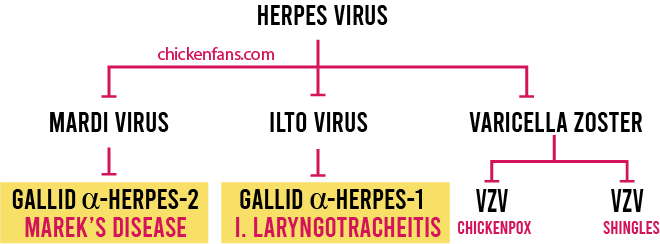
It manifests itself in two forms: the mild and the severe form. The severe form significantly impacts the chicken’s respiratory tract, sometimes resulting in blood in the mouth. Due to the infection, chickens have difficulty breathing and make gurgling sounds.
Apart from the gurgling sounds, chickens will also show the following symptoms:
- coughing, sneezing, strange breathing
- coughing blood, gasping for air
- nasal discharge, facial swelling
- eye infection with discharge, tearing, foamy and bubbly eyes
- head-shaking
Unfortunately, there is no medication to treat infectious laryngotracheitis. Most chickens recover on their own after two weeks. However, some birds may show symptoms for much longer, and complicated infections can be fatal. Vaccines are available, but the vaccinated chickens will still spread the herpes virus.
5. Water Belly (Ascites Syndrome / Pulmonary Hypertension)
Water Belly (Ascites Syndrome) in chickens is a serious condition in broiler chickens where an accumulation of body fluid in the abdominal cavity causes the belly to become enlarged and swollen. Due to rapid growth, the heart fails, and fluid leaks into the body, causing ascites.
When broiler chickens grow too fast, the right heart fails to pump blood effectively. This increases the blood pressure in the vessels leading to the lungs (pulmonary hypertension). As a result, fluid leaks from these vessels and accumulates in the surrounding tissue of the abdominal cavity, causing a water belly.
The fluid can also accumulate in the lungs and cause pulmonary edema. This causes breathing problems, with chickens making weird gurgling sounds.
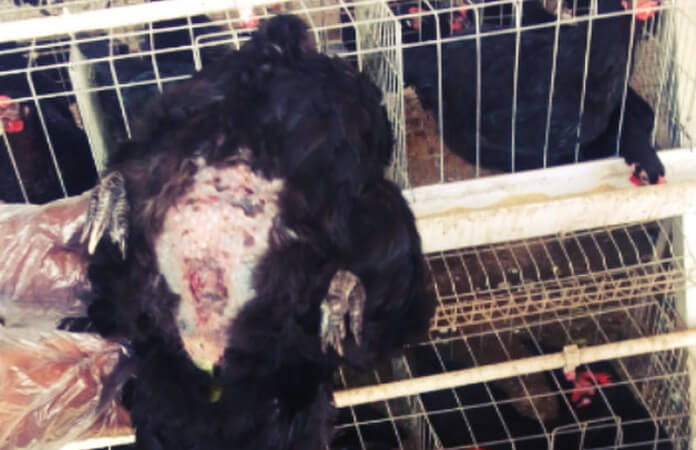
Symptoms of water belly in chickens include:
- distended, swollen belly
- difficulty breathing, gurgling sounds
- pale, purple comb
- shortness of breath
- impaired growth
- lethargy
- acute death
The condition is a huge problem in commercial broilers but is less common in backyard chicken flocks. You can encounter ascites when raising fast-growing meat chickens that are somehow related or similar to broiler breeds.
Ascites can be caused by various factors such as genetics, high-altitude rearing, or chronic respiratory disease. To learn more about the treatment of ascites, check our article on water belly in chickens.
Summary
Gurgling sounds in a chicken’s lungs are usually the result of a viral or bacterial infection. In broiler chickens, a water belly is another common source of gurgling sounds and difficulty breathing.
These five conditions cause gurgling sounds in chickens:
- Infectious Bronchitis – coronavirus
- Chronic Respiratory Disease – Mycoplasma G. bacteria
- Infectious Coryza – bacteria
- Infectious Laryngotracheitis – herpes virus
- Water Belly with an accumulation of water in the lungs
Bacterial infections can be treated with antibiotics. For viral infections, there are vaccines available for prevention.
If you want to read more about chicken health problems, symptoms, and diseases, check out our ‘Health Page‘. You’ll find a ‘Symptom Checker‘, a complete list of ‘Chicken Behavior‘, and an overlook of the most common ‘Chicken Diseases‘. Or go to ‘The Classroom‘ and find a comprehensive list of all Chicken Fans articles.

Dr. M. Tanveer is a licensed veterinarian with several years of experience with chickens. He got his degree from the Faculty of Veterinary and Animal Sciences of the Islamia University of Bahawalpur and has firsthand experience as a veterinarian on broiler breeder farms.


